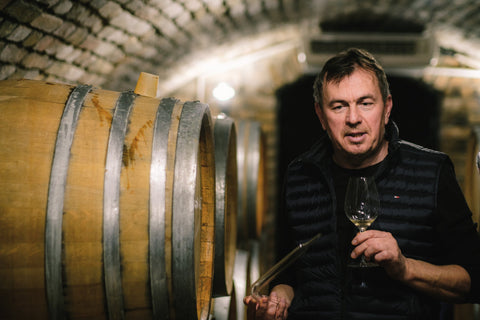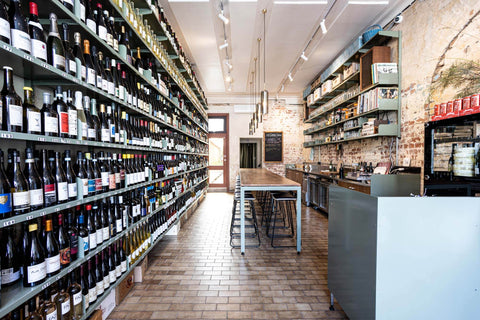Josef’s family has lived in the hilltop village of Oberfucha since the 16th century where the family began in agriculture and brickworks. In the 17th century, Maria Theresia, archduchess of Austria, granted the property owner, whose name was Geyer, a concession to transport wine on the Danube in trade with Hungary and other regions along the river. The ship on the wine label references this. The modern winery is housed in a 16th-century baroque structure built of brick, with cellars beneath it constructed between the early 1300’s and the late 1700’s. Among these is the historic “French cellar” where Napoleon’s army stored their wine rations during a battle in nearby Wagram. The room’s perfect temperature and humidity make it an ideal place to archive the best of each vintage. In 1986, after studying agriculture in Vienna and spending time in San Rapael, Argentina, Josef’s mother Ilse joined her father in wine production. Over the last decade, Ilse has handed over winemaking to her son Josef. Today the family works together in the vineyards and cellar producing wines reflective of their site, and nurturing a polyculture farm that supports the health of the vineyard and soil.
Surrounding Geyerhof's winery are slopes covering roughly 20 hectares, where the art of biodynamic farming is meticulously practiced. The winery's east side features loess and alluvial terrains, known as Gaisberg and Rosensteig, while to the northwest stand primary rock landscapes, named Steinleithn and Kirchensteig. The south showcases rich, loamy grounds, referred to as Hoher Rain. Geyerhof champions vineyard methodologies that bolster and enhance indigenous species of both flora and fauna. This includes sowing plants that naturally absorb nitrogen, enriching the ground with compost and rock dust, and strictly abstaining from synthetic pesticides, fungicides, herbicides, and mineral fertilisers. This holistic approach has not only transformed the terrain but is also vividly mirrored in the vibrant abundance and health of Geyerhof's landholdings.
Grüner Veltliner occupies 60% of the vineyard expanse followed by Riesling at 20%. The remaining area plays host to a blend of Zweigelt, Weissburgunder, Chardonnay, and Gelber Muskateller. Recent clonal selections were brought from the oldest vineyards of Weingut Knoll in the Wachau.
Annually, the team at Geyerhof dedicates more than 5000 hours to tasks like pruning, trellising, and nurturing the rootstocks and canopies. Their dedication to biodynamic viticulture shines through their commitment to hand-harvesting. It's their belief that by allowing nature to thrive in and around their vineyards, they can reap the finest gifts it provides. With over 13% of their land dedicated to hedges and conservation spaces, the presence of varied cover crops, teeming with wild herbs, creates a sanctuary for beneficial insects. This biodiversity eliminates the need for insecticides, boosts the vines’ natural defenses, and invigorates the soil's ecosystem.
The ancient cellars under Geyerhof leading to the modern winery
In the cellar, the primary objective is to preserve the excellence cultivated in the vineyard, ensuring each wine's distinct character through a deliberate minimal intervention approach. They eschew "miraculous" enzymes, cultivated yeasts, and fining agents, employing only the most essential technological aids and interventions. Geyerhof embraces contemporary cellar technologies such as stainless steel tanks, steam cleaning, and solar panel-derived renewable energy to complement the winery's forward-thinking approach. The resulting wines not only radiate unique character but also stand the test of time.
Grapes are meticulously hand-harvested and carefully selected directly in the vineyard. By pressing entire, healthy clusters and allowing the must to oxidise deliberately in the pressing tray, the resulting wine achieves richer flavours and enhanced longevity. The wines undergo fermentation and maturation in temperature-regulated stainless steel tanks with a 3,000-litre capacity. The fermentation process is methodical and uniform, never surpassing 22°C. While a select few whites, and the reds, mature in neutral oak or Acacia casks, the majority benefit from spontaneous fermentation or that initiated by indigenous yeasts. For the whites, malolactic fermentation is intentionally bypassed. The only addition post-fermentation is a touch of sulphur. The wines are allowed to rest on their lees until they undergo a gentle filtration process right before being bottled.
2021 Stockwerk Grüner Veltliner
The Stockwerk delivers outstanding value for an entry level wine. The fruit originates in the younger vineyards in and around the village of Oberfucha and is usually from granite and gravel soils. These are also the cooler sites buffered by forests, grazing land for their cattle, and northeast facing. While an entry level wine, the Stockwerk sees some extended time on the lees, imparting some serious textural chops that elevate the wine’s complexity and longevity. This is an excellent varietal example of Grüner Veltliner, and also a great representative of the Kremstal region. View in our shop.
2021 Hofstudien Grüner Veltliner
For the family, this vintage signifies the momentous 15th-generational transition, with Josef and Maria officially stepping into Ilse’s shoes. This shift in leadership coincides with legislative changes in wine regulations, leading to the removal of the "Gaisberg" single vineyard designation. Recognized for its deep loess soils, this area consistently yields fruit that's robust, taut, and structured, with harvesting often extending into mid to late October even during warmer seasons. The Grüner from Gaisberg has been reimagined, christened “Hofstudien,” translating roughly to "Geyerhof studies." From this singular vineyard, four distinct techniques have been employed to magnify the innate qualities of the grapes: phenolics from the basket press, a touch of saltiness from the Hamburger method (a nod to another producer we impor—Bott Frigyes), fruitiness via carbonic maceration, and extended maceration serving as the final touch. The end product is an innovative Grüner, presenting the vineyard in an intricate, unfiltered perspective. The wine's label is the work of FLOWSOFLY, a Viennese artist who, captivated by their wines, approached the family to design some labels. View in our Shop
2020 Steinleithn 1ÖTW Grüner Veltliner (Monopol)
The Steinleithn single vineyard, covering a modest 1.4 hectares and positioned southwest, is characterized by its impoverished soil. With a scant topsoil layer, the vineyard truly lives up to its name, as "Stein" translates to "stone." Below, the soil brims with minerals like feldspar, quartz, and mica, often prolonging ripeness until November. Fermenting the late harvest results in an alcohol content of approximately 14%. However, the fruit leans towards the savoury side, and its acidity remains undiminished. Representing Geyerhof's emblematic ethereal minerality and pristine quality, this Grüner Veltliner possesses a sophisticated finesse. Wines from this terrain mature splendidly, making them worthy of patience and attention. View in our shop.
2015 Große Reserve Grüner Veltliner
Harvested by hand in small crates in the first days of October 2015, followed by tender pressing of whole bunches, unhurried fermentation, and a 6.5-year maturation on full lees in a three-decade-old acacia barrel — this encapsulates Geyerhof's wine craftsmanship. The wine unfolds with graceful vigour, presenting nuances of refined minerals, succulent stone fruit, and subtle spices. Awaiting in the cellar, this wine promises to bestow generous rewards with time. View in our Shop.
2021 Sprinzenberg Riesling
Historical maps of the region have long highlighted the Sprinzenberg location. From inception, this vineyard, adjacent to the estate, has been cultivated by the family. The sparse overlay of sand atop crystalline fragmented granulite results in impoverished soils, enabling the Riesling vines rooted here to exude an exceptional mineral essence.
The scanty soils of Sprinzenberg produce a wine redolent of piquant stone fruit and herbal notes, punctuated with an unexpected salinity. The wine's exquisite mineral intensity coupled with invigorating acidity exemplifies both equilibrium and refinement. Like many of Geyerhof’s wines, wines from Sprinzenberg reward cellaring. View in our Shop.
2020 Kirchensteig 1 ÖTW Riesling (Monopol)
This Monopol vineyard is the first impression you get when pulling up to the property. The soil is mostly granite which you can see flicker in the light and results in wines with lower alcohol and a kiss of residual sugar to balance out the intense acidity. The Kirchensteig was a part of the first 2010 Erste Lage (1er Cru) classification where for nearly twenty years, the Association of Austrian Traditionsweingüter has been classifying the very best vineyards in Austria. It is very special for Geyerhof to have a monopol Erste Lage, and it will be interesting to see how it fares when the first Grosse Lage (Grand Cru) classification takes place in 2027. Hand picked, slowly pressed whole bunches, fermented in stainless steel and aged for 19 months on the lees. View in our Shop.





Comments (0)
There are no comments for this article. Be the first one to leave a message!